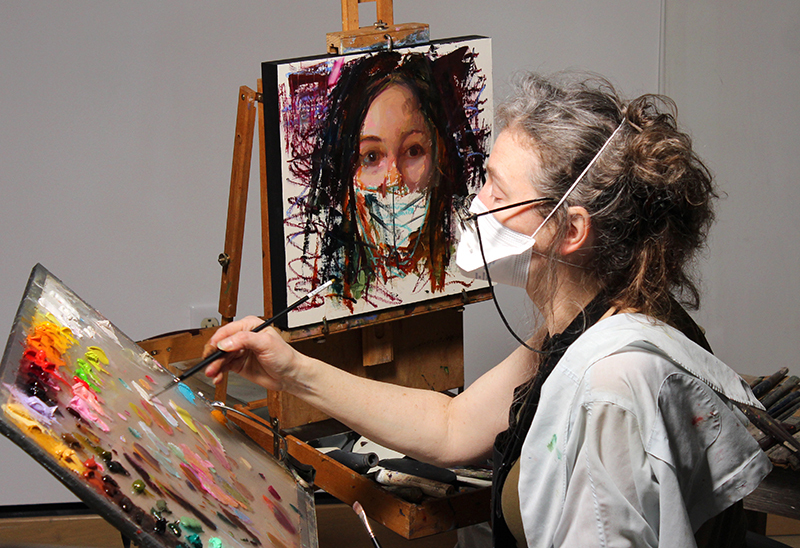Heading into the home stretch
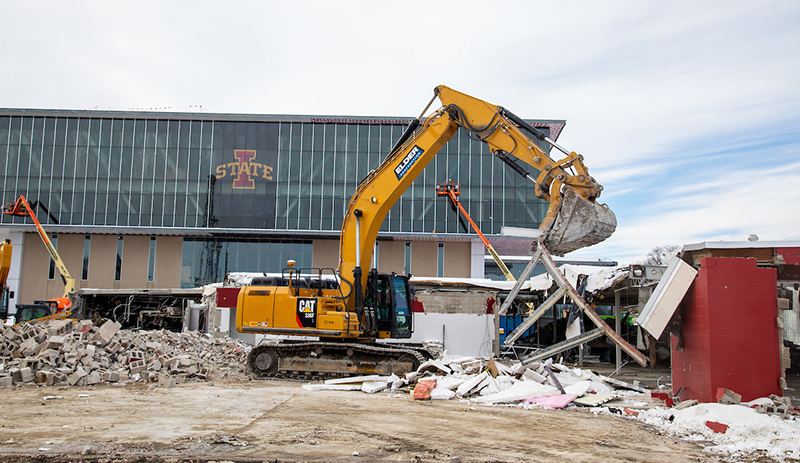
Photo by Christopher Gannon.
An excavator operator works on removing a last section of the athletics department's Olsen Building north of Jack Trice Stadium. The building's demolition during February creates space for the final components of a $90 million project that includes a new building -- the multifunction sports performance center (background), which connects to the Bergstrom football complex -- ground floor renovations and north modifications to the Jacobson Building and a north elevated concourse and ground-level plaza to improve the gameday experience for football fans.
During January, functions formerly housed in the Olsen Building moved to the Jacobson Building or lower level of the sports performance center, which is about 80% complete and on schedule to wrap up this spring. Work on the north plaza and concourse should be complete by the end of July. The project began about two years ago.
SHOP set to receive tax-exempt status
Students Helping Our Peers (SHOP) is set to receive an assist in the food pantry's battle against food insecurity among Iowa State students.
Last summer's move from the Food Sciences Building to 1306 Beyer Hall added needed space and helped the push to gain 501(c)(3) status, making it a tax exempt nonprofit.
"There is an agreement put in place between the ISU Foundation and the university that the foundation will serve as a 501(c)(3) on behalf of the SHOP, which is a student organization," said SHOP advisor Breanna Wetzler, marketing specialist in the College of Agriculture and Life Sciences.
As a nonprofit, SHOP can access more grants and partner with the Food Bank of Iowa to buy food at a lower price per pound, student wellness dietitian Lisa Nolting said. The partnership means a larger selection of food and the hope it takes away some worry for students.
SHOP locations
- 1306 Beyer Hall, open Tuesday and Friday 10 a.m.-2 p.m. and Wednesday 4 p.m.-7 p.m.
- SUV Community Center, open Monday through Friday 8 a.m.-5 p.m.
- Frederiksen Court, closed due to COVID-19
"Last fall, the students who volunteer at SHOP and our partners in student wellness really worked to come up with what items would fill a student's pantry in terms of likes, dietary needs and dietary preferences," Wetzler said.
After final details between the foundation and SHOP are worked out, there are numerous steps to take before offerings from the food bank can arrive.
"Late summer is our tentative timeline," Nolting said.
The details
With the increase in food comes stricter training as student volunteers will handle perishable and nonperishable items. The addition of refrigeration and freezers allowed the first perishable items to be stocked around winter break. All volunteers must complete food-safety training provided by the Food Bank of Iowa.
"There are a lot of volunteers and a lot who may just do four hours of volunteering a semester to fulfill a course requirement," Nolting said. "It is getting a system in place to manage the volunteer base, but also how to know who has taken the training and who still needs to."
The partnership eliminates the need for students to go to stores to purchase food and bring it back to SHOP. Purchasing is done online, with deliveries arriving once or twice a month.
That likely will require a pallet jack and more people to unload and properly store food.
"Because we are a student-run pantry, we don't have that same person overseeing things every year," Nolting said. "That means we need to figure out how best to train new people to know best practices."
Anonymity a priority
One thing SHOP, which is celebrating its 10th year, prides itself on is anonymity for users to help end the stigma of food pantries.
The Food Bank of Iowa receives several items through the Department of Agriculture (USDA), but SHOP has decided not to accept those items at this time.
"In order for someone to come into the pantry and get some of those USDA items, they have to sign off on a document declaring they are financially eligible to receive them," Nolting said.
Filling a need
SHOP is available to students regardless of whether they live on campus or have a meal plan. Food insecurity is common on campuses across the nation, and the pandemic has increased the need for pantries.
Nationwide, the USDA estimates 36-38% of all college students are food insecure. In 2019, the national college health assessment estimated 24% of Iowa State students are food insecure, Nolting said.
Wetzler said the 501(c)(3) designation will benefit SHOP greatly, but the need for food and money donations remains.
Assistance from employee team
SHOP also is receiving assistance from a group within the 2020-21 Emerging Leaders Academy. Every spring, small teams from the academy each identify a project that improves the university and has a sustained impact.
"We wanted to help SHOP and in the process raise awareness of food insecurity among students," said Karen Kedrowski, director of the Carrie Chapman Catt Center for Women and Politics and a member of the project team.
For the month of March, the group organized a crowdfunding campaign through the ISU Foundation to raise $4,000 to purchase a commercial refrigerator and expand food storage for SHOP.
Kedrowski said team members will publicize it as widely as they can, including with alumni. She said they have asked several university officers and student leaders to endorse the project and are collecting short video messages from each of them.
The group working on the project is:
- Karen Kedrowski, director, Carrie Chapman Catt Center for Women and Politics
- Brian Vanderheyden, director, student wellness
- Tim Shepherd, associate teaching professor, agricultural and biosystems engineering
- Elyse Davis, intern, Catt Center
- Sarah Adams, undergraduate recruitment coordinator, Ivy College of Business
- Rita Phillips, director, ISU Book Store
- Rachel Vos Carrillo, program manager, human development and family studies
- Austin Viall, associate professor, veterinary pathology
Fellows program prepares students to cut an innovative path
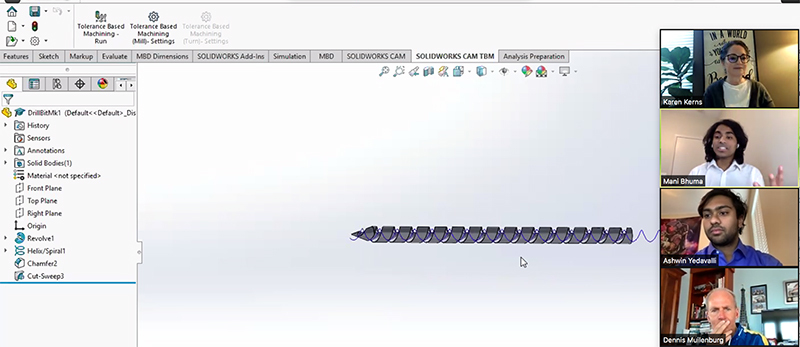
Student Innovation Fellows Corps participants Mani Bhuma and Ashwin Yedavalli talk about their burgeoning space mining company with former Boeing CEO and Iowa State innovator in residence Dennis Muilenburg and entrepreneur in residence Karen Kerns.
Brenner Stickney, a junior in aerospace engineering, is a regular at Iowa State innovation programs such as the weekly Flagship Friday forums. He's noticed a running theme in the presentations.
"The person who did something great never expected that they would do something great," he said. "They didn't know what they were going to do. They just went with it and pushed it, and it ended up being great."
It's an attitude Stickney is hoping to emulate. He's among more than 60 students learning to get in "go" mode in the Student Innovation Fellows Corps, which builds on the array of opportunities in innovation and entrepreneurship at Iowa State -- adding guidance from a mostly volunteer group of faculty, staff and business leaders -- to instigate students to take on a big challenge of their own creation.
The fellows program launched this fall along with the forums, workshops and competitions offered as part of President Wendy Wintersteen's innovation and entrepreneurship initiative. It ties together a wide variety of ISU innovation programs, encouraging students to use the skills and mentality they've developed to cut a self-designed path, said entrepreneur in residence Karen Kerns, who heads the fellows corps and the innovation programming that began last fall.
"Students were doing a lot of these things in the past, but they saw those experiences as a bunch of transactions. They didn't see them as a pattern of behavior, a way of thinking about the world," she said. "We are teaching them to own and make a product of their education. They're better using their college experiences, and they're better using university resources."
How it's structured
Innovation fellows progress through three "relays" to complete the program. The first relay is about mindset and requires attendance at least six Flagship Friday or Short Circuit programs, four fellowship trainings on specific skills and four coaching sessions with experts, either ISU faculty and staff who have volunteered to work with fellows or industry leaders recruited by Kerns. Including an orientation session, held monthly as applications for new fellows are accepted on a rolling basis, the mindset relay covers at least 24 hours of instruction.
The second relay requires at least 120 hours of experiences, which could include coursework in entrepreneurship, capstone projects, innovation-based extracurriculars, competitions, college-based programs such as those in the colleges of Liberal Arts and Sciences and Agriculture and Life Sciences, multi-week circuit programs or the CYstarters student accelerator, among others.
The third relay is the big challenge, a deliberately open-ended endeavor which can be an individual or group project, creating or building a business, developing an innovative practice or proposal, or even the creative component of a thesis. Students submit their challenge plans to Kerns, who connects them with relevant industry leaders or ISU experts for mentoring. The challenge projects must take at least 200 hours of documented work.
Fellows who meet the minimum requirements are awarded a cardinal pin, while those with additional hours can earn a gold pin. Students who don't complete a challenge but satisfy the first two relays receive a certificate. Seven graduating students will be recognized for their fellowship achievement in an April 23 ceremony, including five at the gold level.
The relays don't have to be sequential, Kerns said. While the coaching sessions in the mindset relay are often used to help identify a challenge, students with a set plan can hit the ground running, she said.
"It's nonlinear. You can literally be working on your big project while you go through your first six sessions or while you're taking courses," she said. "They need to have an idea that's worthy of the time of the innovator we would pair them with, but you can be 18 years old. You don't have to wait, if you're ready."
Booming business
Owen Cline, a senior in industrial technology, was a fellow who joined the program with a concrete agenda: grow Cline Design Creations, his metal sign-making business. He makes the signs in a machine shed at his parents' home in Brooklyn, Iowa, using a computer-controlled plasma table that cuts metal with superheated air.
Cline had been selling the signs since he was a teenager but expanded his business to online sales in fall 2019. He did about $200 per month in sales on Etsy, at first. Thanks to a boost in his marketing, business exploded in late 2020. He racked up $170,000 in sales for the year and had to hire his younger sister to keep up with holiday orders.
"I'm not worried about tuition, I'll say that much. And my sister doesn't have to worry about it, either," he said.
His mentoring sessions with Kerns guided him through the growth, keeping him focused on future considerations such as expanding into a new building and promoting the more profitable direct sales from his website. Working with her and others helped put him in a position to work full-time on building his business after he graduates in May.
"They ask the tough questions and really make you flesh out your value proposition," he said.
Honing an idea
Kerns said she got the idea to start the fellows corps after Mani Bhuma, a senior in aerospace engineering, told her that while he had learned technical excellence at Iowa State, he needed to learn how to think and how to behave like an innovator. The program has far exceeded his expectations.
"It's everything that you could expect and more," he said.
For his big challenge, Bhuma is on a team working on space mining. Members meet every Saturday to build computer models of technology they're designing to mine asteroids for ice, minerals and soil. Mining extraterrestrial materials for use in space avoids the cost of launching those materials from Earth, which costs about $4,400 per pound.
"Turning ice into drinkable water would be crucial," said team member Ashwin Yedavalli, a senior in mechanical engineering.
Their professional practice coach is former Boeing CEO and Iowa State innovator in residence Dennis Muilenburg, who holds multi-week training sessions for the program and is individually coaching more than a dozen fellows. In his coaching role, Muilenburg said he looks to connect dots for students as they hone their ideas. For example, he helped the space mining team members zero in on the mechanisms used for drilling to develop their broad interest into a business plan.
"The water idea is quite brilliant," he said. "If you can find ice in space on an asteroid and bring it from low gravity to low gravity, that's a pretty cool solution."
Muilenburg said he loves the audacity of the team's plan, the spirit it takes to attempt it and what the students will figure out along the way.
"Learning to have a big idea and then put the details together around it to turn that idea into a reality, working through the steps, is a process that's going to be valuable in your life," he said.
Listening to the buzz
About a dozen business leaders and another dozen faculty and staff are volunteering to coach fellows. The challenge team Stickney works with has two faculty coaches and is exploring how to automate existing technology to detect the sounds of insects. Currently, entomologists studying insect populations set traps to catch specimens, which is brutal and, for endangered insects, counterproductive, Stickney said.
"The more tests done on the rusty patched bumble bee, the more they're killed," he said.
Recording the sounds emanating from insects and using machine learning to process the data could allow a live feed showing where insects are, which would have numerous applications.
The idea was suggested to Stickney by entomology professor Matt O'Neal. Aerospace engineering department chair Alric Rothmayer is on board to help connect the team with aerospace engineering faculty and resources, potentially including the department's anechoic chamber, which would be a good place to test the software.
O'Neal said he initially got involved in innovation programs a couple months ago, and it's an interest that's fed on itself, in part because of the connections he gets to forge with students and faculty he wouldn't otherwise meet.
"I would not have had this meaningful interaction with engineers if not for Karen and the innovation program. It's unfortunate, but disciplines get siloed and colleges get siloed. This is an awesome opportunity to cross those silos," he said.
Standing committee named for review of requests to rename university property
President Wendy Wintersteen has named the standing committee that will consider requests to remove names from university property. The group will begin its work this semester and is expected to continue into the fall.
Chairing the committee will be Carol Faber, president of the Faculty Senate and associate professor of graphic design. Last year, Faber and vice president for diversity, equity and inclusion Reginald Stewart co-chaired the committee that developed the policy on consideration of removing names from university property.
Joining Faber on the committee are:
- James Andrews, University Professor, department of history
- Theressa Cooper, assistant dean for diversity, College of Agriculture and Life Sciences
- Jon Fleming, retired physician, Ames
- Morgan Fritz, president, Student Government
- Chad Gasta, chair, department of world languages and cultures
- Carmen Gomes, associate professor, mechanical engineering
- Monica Gordillo, associate teaching professor, management
- Beth Hartmann, teaching professor, Program for Women in Science and Engineering
- Chelsea Iennarella-Servantez, senate engagement officer, Graduate and Professional Student Senate; DVM/Ph.D. student, biomedical sciences and animal science
- Clayton Johnson, director of student services, College of Human Sciences
- Sara Marcketti, Morrill Professor and director, Center for Excellence in Learning and Teaching
- Brendan O'Brien, director, International Students and Scholars Office
- Jo Anne Powell-Coffman, associate dean for research, College of Liberal Arts and Sciences
- Mack Shelley, chair, department of political science
- James Wright, associate teaching professor, department of agricultural and biosystems engineering
- Paula DeAngelo, deputy counsel, office of university counsel (ex-officio)
"I want to thank Carol Faber and the committee members who accepted my request to serve in this important role for our university community," Wintersteen said.
Up first: Catt Hall
Wintersteen said the committee's first assignment will be a review of Catt Hall, named for alumna Carrie Chapman Catt. Since last fall, when the renaming policy was established, several requests to review the building have been submitted through the Consideration of Removing Names from University Property website.
"Because the naming of Catt Hall has been a recurring issue for more than a quarter of a century, the university will provide support to assist with research, organization and report development, as the standing committee will serve as the body that reviews this important issue," Wintersteen said. "As part of that support, we are in the process of securing an outside consultant with expertise in historical research to gather and organize factual evidence."
Committee has process to follow
Wintersteen said the policy development committee met its charge last year of developing a process to ensure a consistent, evidence-based and historically thoughtful way to evaluate naming decisions. The procedures linked to the university policy outline how to prepare a recommendation and how to receive feedback and public comment.
"Thanks to that group's work, the new standing committee has a set of principles to guide it in studying the facts, investigating allegations and arriving at a fully informed recommendation," she said.
The committee will submit a final report with a recommendation to the president for a decision. If a decision calls for removal of a name from a major unit such as a building, the president will prepare a recommendation for the Iowa Board of Regents, which will make a final decision based on its own naming policy.
After Catt Hall, it is expected that a plaque recognizing W.T. Hornaday will be the second historical naming decision the committee will review.
Wintersteen sought nominations for individuals to serve on the standing committee from senior leaders, deans, student leaders and others.
Making progress at Ross Hall
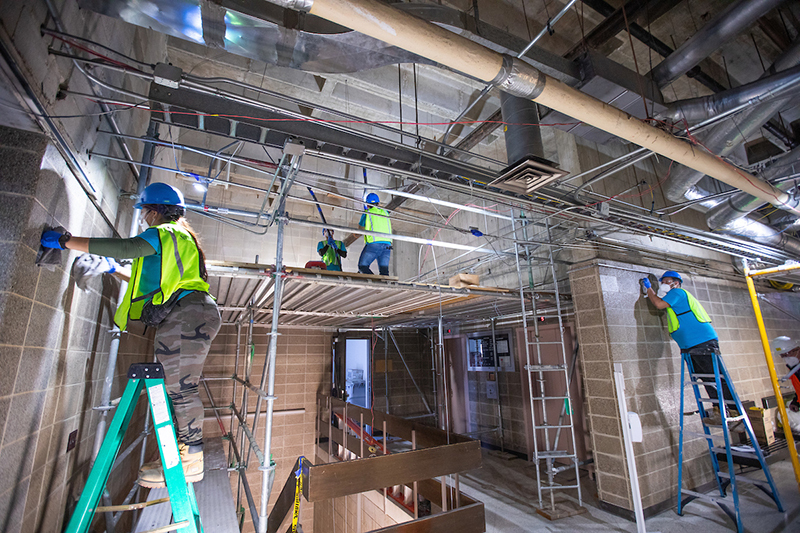
A Servicemaster team scrubs soot-covered walls and vacuums HVAC space above the ceiling line Wednesday morning on first floor Ross Hall. Photo by Christopher Gannon.
Cleaning to remove soot from nearly all surfaces in Ross Hall continues following the Feb. 22 morning fire in a first-floor custodial closet. It's a process that is expected to take disaster recovery teams from Servicemaster at least six more weeks.
First floor sustained the heaviest damage. For example, while ceiling tiles will be replaced on all floors, the ceiling grid and corridor lights also have been removed and will be replaced on first floor.
Restoring Ross Hall will include cleaning the ductwork and "scrubbing" the air for soot particles. Filters are changed twice a day on equipment tasked with the latter. A control panel for the building's fire alarm system was damaged in the fire, so the system must be replaced. Crews from West Des Moines-based Certified Restoration Drycleaning Network are cleaning all electronics and Wi-Fi hotspot devices. That process will take an estimated 45 days.
Spring and summer classes scheduled for Ross Hall were moved to other locations, and the goal is to have the building fully functional in August for the start of fall semester.
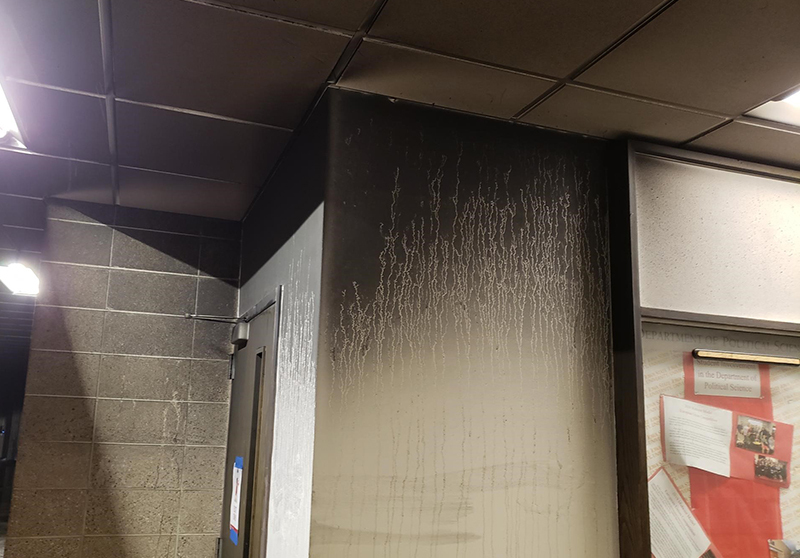
Smoke and soot damaged every surface on first floor Ross Hall last week. Photo courtesy of facilities services.
Multiple in-person events is the goal for spring commencement
If COVID-19 cases remain in check, Iowa State will hold four in-person spring graduation events May 7-8, including a six-chapter event Saturday in Jack Trice Stadium that honors bachelor's degree recipients one college at a time. President Wendy Wintersteen shared plans with the university community in a March 1 letter.
"While it is our intent to offer modified in-person commencement activities, we will change course if necessary and as conditions warrant to maintain the safety of our graduates and guests," she wrote.
As proposed, ceremonies for bachelor's and master's students would be held outdoors at the football stadium, and ceremonies for doctor of veterinary medicine and all other doctoral candidates would be held in Hilton Coliseum. For COVID-19 safety reasons, the undergraduate "Cyclone Graduation Celebration" will take the place of college convocations, and college/department staff will assist with their college's event at the stadium, said associate registrar Amber Tiarks.
The selected venues will provide space for graduating students and guests to practice physical distancing. All attendees will be required to wear face coverings, and the programs will be shortened, Wintersteen wrote.
The proposed schedule is:
Friday, May 7
- 11 a.m., ceremony for master's candidates, Cardinal stage, Jack Trice Stadium
- 3 p.m., ceremony for DVM candidates, Hilton Coliseum
- 7 p.m., ceremony for Ph.D. candidates, Hilton Coliseum
Saturday, May 8
- 9 a.m.-4:30 p.m., six undergraduate events by college, Cardinal and Gold stages (east and west sides), Jack Trice Stadium
"We are proud of all of our students for their resilience and determination to continue their academic progress, and we look forward to celebrating safely in-person with our newest graduates this spring," Wintersteen wrote.
She noted the venue selections were based in part on the athletics department's protocols and success in holding safe events in them this fall and winter. The intent is to not limit attendance at the stadium ceremonies, however guest capacities will be in place for the two Hilton ceremonies. As another safety strategy, participation in the graduation ceremonies will be limited to students graduating either this spring or summer. Students who completed their degrees in spring, summer or fall 2020 were honored at virtual ceremonies, and university leaders still plan to invite them to a future in-person opportunity, Wintersteen said.
Virtual field trip helps design students see bigger picture
Julie Irish likes to give students the chance to try something new and help people who have a different background than themselves. In past years, that meant a field trip for the Inclusive Environments course in the College of Design.
The senior/graduate-level course was supposed to include a trip to St. Louis last fall to study and design housing for people with HIV or AIDS. Instead, it became a virtual undertaking through Zoom.
"They are seniors, and I felt it was important for them to have this because they were having difficulties and maybe having to quarantine," said the interior design assistant professor. "I wanted it to be as normal as possible -- which is why I was teaching in person -- and not miss out on the experience."
Making it happen
Irish began planning the virtual tour before the start of the fall semester by reaching out to ISU alumni Brian Hurd and Cecelia Dvorak in the St. Louis area. Hurd is a technical assistance program manager for Rise Community Development, and Dvorak is a city planning executive for the city of St. Louis. Both graduated from the community and regional planning department.
"I talked to [Hurd], who I had worked with before, and I knew he worked with a housing group that did work for people with HIV and AIDS," Irish said.
The course centers around ideas of inclusivity and accessibility, so Irish uses a service-learning project as the focus. In fall 2019, students developed living plans for young adults with autism.
She worked with Hurd and Dvorak to plan what could be done and who students could interact with during a Zoom call.
It wasn't the first time Irish had to improvise because of the pandemic. Last spring, students in her Advanced Color class were unable to hold an end-of the-semester exhibition, but Irish collaborated with information technology services to develop a website to display their work.
Virtual field trip
Irish broke the field trip into 45-minute segments to keep the 18 students involved, beginning at 8 a.m. and finishing at 1:45 p.m.
"Sitting in front of a computer all day can be very tiring, so I wanted to find a way to keep them involved and engaged," she said.
The city of St. Louis planning department provided an overview of the site where the houses would be built and a community development group that put the project together shared details. Students took a drone tour of the surrounding area to see the project in the larger context of the city.
"They talked about how it had taken years to find the right location and develop it within the city," Irish said. "Even though our students couldn't physically go there, they could really envision the space.
"The CEO of the nonprofit Doorways Housing that is building the homes told the students more about the type of people who need housing and why they need it."
Irish also tapped into resources from her alma mater, the University of Minnesota, who lead HIV and AIDS educational programs.
"There were a pair of experts who had a Q&A session with the students," Irish said. "I wanted to give students a more human dimension so they knew who they were designing for."
Outcome
The students' final project was to create plans, materials and furnishings for the houses. They also conducted extensive research about the city, community and housing project.
"They put together physical drawings and renderings," Irish said.
Those were shared with Doorways Housing in an effort to help generate or inspire design ideas as groundbreaking began last November.
"The research and programming documents were very comprehensive, and they had obviously thought about and understood who they were designing for," Irish said. "I think if you presented their final projects to another designer, they wouldn't know our students didn't have in-person experience."
Advantages
Irish said not going to St. Louis kept students from visiting museums or building camaraderie by sharing meals. But also it had advantages she likely will incorporate in her courses even when trips are possible again.
"If we had gone, we wouldn't have invited the experts from Minnesota to an online meeting," she said. "From that perspective, we were able to get more people together than if we had been in person."
Iowa State is among the top producers of 2020-21 Fulbright Scholars
Iowa State is among the U.S. colleges and universities that produced the most Fulbright U.S. Scholars for 2020-21, as announced by the U.S. Department of State's Bureau of Educational and Cultural Affairs.
The Fulbright Program is the U.S. government's flagship international educational exchange program. The annual list appears in The Chronicle of Higher Education. Six Iowa State scholars were offered Fulbright Awards for 2020-21.
"The hallmark of an Iowa State education is a unique combination of practical and critical thinking skills that prepare students for success long after their time on campus has ended," said senior vice president and provost Jonathan Wickert. "In today's global society, the ability to learn from the international experiences of our faculty has never been more important."
Iowa State's Fulbright Scholars for 2020-21 are:
- Carol Chapelle, Distinguished Professor of English. Host institution: Carleton University, Ottawa, Ontario, Canada.
- Johnny DiBlasi, assistant professor of art and visual culture. Host institution: MuseumsQuartier, Vienna, Austria.
- Elizabeth Elmi, former lecturer in music and theatre. Host institution: University of Basilicata, Potenza, Italy.
- David Jiles, Anson Marston Distinguished Professor in Electrical and Computer Engineering. Host institution: Indian Institute of Technology, Delhi.
- Joanne Marshall, associate professor in the School of Education. Host institution: University of Namibia, Windhoek.
- Ellen McKinney, associate professor of apparel, events and hospitality management. Host institution: Bunka Gakuen University, Tokyo, Japan.
The Fulbright Program was created to increase mutual understanding between the people of the United States and the people of other countries. Fulbright is the world's largest and most diverse international educational exchange program. The program's primary funding source is an annual appropriation made by the U.S. Congress to the U.S. Department of State's Bureau of Educational and Cultural Affairs.
2021 marks the 75th anniversary of the Fulbright Program. Since its inception in 1946, more than 400,000 people from all backgrounds -- recent university graduates, teachers, scientists and researchers, artists, and more -- have participated in the Fulbright Program. Fulbright is active in more than 160 countries throughout the world.
Student faces being added to portrait series this week
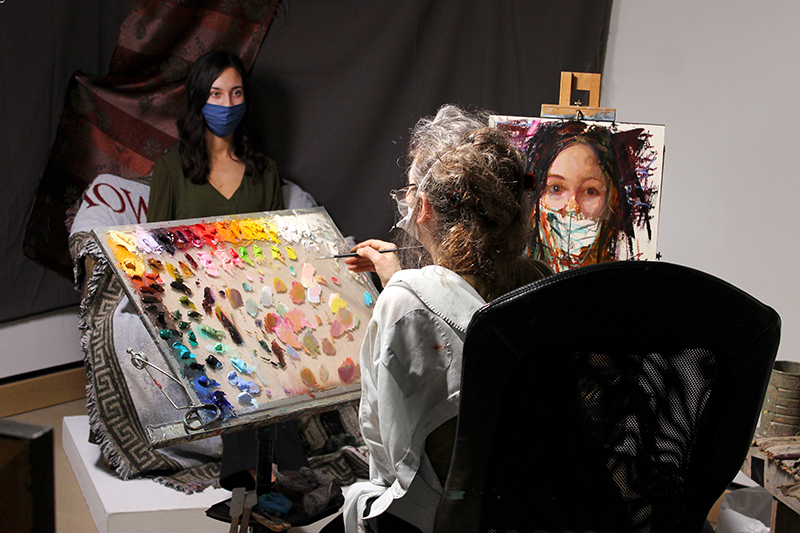
Photo courtesy of university museums.
Maquoketa artist Rose Frantzen is back on campus this week to create six more portraits for university museums' "Faces of Iowa State" series. Frantzen is painting two portraits each day Wednesday, Friday and Saturday (10 a.m. and 4 p.m. daily). Senior kinesiology major Tessa Mendoza (pictured) was the first to sit for her portrait Wednesday morning. University museums is livestreaming all six sittings on its YouTube channel; each takes approximately four hours.
